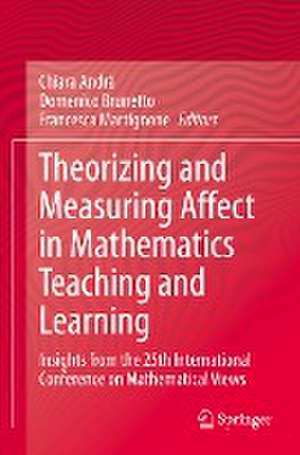Theorizing and Measuring Affect in Mathematics Teaching and Learning: Insights from the 25th International Conference on Mathematical Views
Editat de Chiara Andrà, Domenico Brunetto, Francesca Martignoneen Limba Engleză Paperback – 24 ian 2022
| Toate formatele și edițiile | Preț | Express |
|---|---|---|
| Paperback (1) | 639.73 lei 6-8 săpt. | |
| Springer International Publishing – 24 ian 2022 | 639.73 lei 6-8 săpt. | |
| Hardback (1) | 646.11 lei 6-8 săpt. | |
| Springer International Publishing – 24 ian 2021 | 646.11 lei 6-8 săpt. |
Preț: 639.73 lei
Preț vechi: 752.63 lei
-15% Nou
Puncte Express: 960
Preț estimativ în valută:
122.41€ • 133.39$ • 103.15£
122.41€ • 133.39$ • 103.15£
Carte tipărită la comandă
Livrare economică 23 aprilie-07 mai
Preluare comenzi: 021 569.72.76
Specificații
ISBN-13: 9783030505288
ISBN-10: 3030505286
Ilustrații: XX, 262 p. 33 illus., 20 illus. in color.
Dimensiuni: 155 x 235 mm
Greutate: 0.4 kg
Ediția:1st ed. 2020
Editura: Springer International Publishing
Colecția Springer
Locul publicării:Cham, Switzerland
ISBN-10: 3030505286
Ilustrații: XX, 262 p. 33 illus., 20 illus. in color.
Dimensiuni: 155 x 235 mm
Greutate: 0.4 kg
Ediția:1st ed. 2020
Editura: Springer International Publishing
Colecția Springer
Locul publicării:Cham, Switzerland
Cuprins
Part 1: theorising and measuring affect.- Introduction to the work of MAVI 25; Chiara Andrà and Francesca Martignone.- Collective chapter C; Maike Vollstedt, Ralf Erens, Andreas Eichler, and Vesife Hatisaru.- Collective chapter B; Andrea Maffia, Jens-Oliver Krummenauer, and Boris Girnat.- Part 2: understanding students’ beliefs; Understanding beliefs, capturing beliefs and changing beliefs: theory and methods; Guenter Toerner, Andreas Eichler and Ralf Erens.- Comparing and contrasting personal meaning and value; Neruja Suriakuraman, Maike Vollstedt & Markku S. Hannula.- “[he] Has impaired vision due to overworking”: students’ views about mathematicians; Vesife Hatisaru.- Pupils’ beliefs about mathematical content thinking represented in photos from everyday life all over the world; Sabrina Blum.- How to design an activity that influences middle school students’ beliefs about mathematics as a discipline; Maria Kirstine Oestergaard.- Part 3: teachers’ beliefs.- Introduction to teachers’ beliefs and change; Chiara Andrà and Domenico Brunetto.- How large scale tests impact on teacher practice: an exploratory study on teachers’ attitudes; Federica Ferretti, Slivia Funghi and Francesca Martignone.- A clustering method for multiple-answer questions on pre-service primary teachers’ views of mathematics; Federica Ferretti, Alice Lemmo, Andrea Maffia, Simone Rossi Tisbeni.- Primary school teachers’ awareness of Learning opportunities related to statistical variation; Jens Oliver Krummenauer and Sebastian Kuntze.- Beliefs of teachers concerning teaching and learning with Digital technology in upper secondary level in mathematics; Joyce Peters-Dasdemir and Barbel Barzel.- Professional development of teacher educators, strategies for spreading innovations and connected beliefs; Ralf Erens.- Part 4: a focus on transition(s).- Introduction on transition issues; Chiara Andrà.- A multidimensional model of mathematics self-efficacy to analyse first-year students’ mathematical self-assessment, performance, and beliefs change; Boris Girnat.- Does the relationship between mathematics achievement and students’ self-concept change from primary to secondary school?; Elisa Caponera, Laura Palmerio, Stefania Pozio.- A massive phenomenon from a qualitative perspective; commentary by Francesca Gregorio.- A non-affective perspective; commentary by Francesca Martignone and Pier Luigi Ferrari.- The perspective of a tutor (and a teacher); commentary by Paola Landra.- Anonymous or not?; commentary by Chiara Andrà, Domenico Brunetto and Alessia Pini.- Part 5: cultural and multicultural perspectives.- Collective chapter A; Stefania Pozio, Maria Kirstine Østergaard, Sabrina Blum and Federica Ferretti.- Invited chapter on cultural beliefs; Silvia Funghi.- Experiences of empowerment in mathematics; Chiara Andrà and Domenico Brunetto.
Notă biografică
Chiara Andrà is Senior Researcher at the Technological Innovation and Science Department, Università del Piemonte Orientale (Italy). She teaches mathematics for the Bachelor Degree in Biology and mathematics education for the master degree in Sciences. Her research interests include: emotions in mathematics, social interactions in small group activities in the math classroom, the transition from secondary to tertiary education, and mathematics teacher education.Domenico Brunetto is Junior Researcher at the Mathematics Department, Politecnico di Milano (Italy), where he teaches calculus for the Bachelor Degree in Architecture and Innovative teaching skill for PhD students. His main research interests concern: distance and blended learning, with a special focus on MOOCs; the use of multimedia in classroom practices; interactions among students in small and large groups; real-life mathematical problems. His last research project was devoted to design and develop practices for teaching mathematics to young immigrants and to students with low socio-economic status.
Francesca Martignone is Associate Professor at the Technological Innovation and Science Department, Università del Piemonte Orientale (Italy). She teaches mathematics for the Bachelor Degrees in Biology and in Chemistry, and mathematics education for the master degree in Sciences. She is involved in several programs for in-service mathematics teachers Professional Development. Her research interests include: problem solving, assessment, and mathematics teacher education.
Francesca Martignone is Associate Professor at the Technological Innovation and Science Department, Università del Piemonte Orientale (Italy). She teaches mathematics for the Bachelor Degrees in Biology and in Chemistry, and mathematics education for the master degree in Sciences. She is involved in several programs for in-service mathematics teachers Professional Development. Her research interests include: problem solving, assessment, and mathematics teacher education.
Textul de pe ultima copertă
This book presents a literature review of and a state-of-the-art glimpse into current research on affect-related aspects of teaching and learning in and beyond mathematics classrooms. Then, research presented at the MAVI 25 Conference, which took place in Intra (Italy) in June 2019, is grouped in thematic strands that capture cutting-edge issues related to affective components of learning and teaching mathematics. The concluding chapter summarises the main messages and sketches future directions for research on affect in mathematics education. The book is intended for researchers in mathematics education and especially graduate students and PhD candidates who are interested in emotions, attitudes, motivations, beliefs, needs and values in mathematics education.
Caracteristici
Presents new methodologies for data analysis, especially for quantitative research Brings forth new perspectives on teacher beliefs Contains a literature review on different theoretical perspectives
